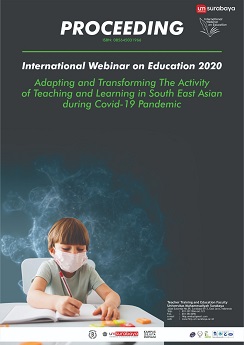Digital learning from home and the future of post-pandemic education
Abstrak
Abstract.
This paper explains how the learning process from home is carried out during the pandemic era and how it will impact the future of education. The approach in this research is qualitative with the literature review method. But to strengthen the data, this study also uses interviews. In this pandemic era four obstacles were discovered, firstly the readiness of devices and networks, the cost of the internet network and the digital literacy capabilities of parents and teachers. In addition, learning done from home through online during the pandemic era had an impact on the future of ducation in Indonesia. The learning experience in the pandemic era is increasingly a sign that it is not a single school or college that determines success. The decisive digital era is creativity and digital literacy, second, the class will be more flexible than ever which does not always require students to always come physically to school, and finally the stronger academic inflation, where degrees are no longer a sign of prestige.
Referensi
H. Darmadi, Pengantar Pendidikan Era Globalisasi. Tanggerang : An1mage, 2019.
L. L. Smith and C. H. Elliott, Child Psychology & Development For Dummies. canada: canada : Wiley Publishing, Inc., 2011.
E. Çam and M. Kiyici, ―Perceptions of Prospective Teachers on Digital Literacy.,‖ Malaysia Online J. Educ. Techology, vol. 5, no. 4, pp. 29–44, 2017.
N. Kurnia, E. Wendratama, W. M. Adipura, and I. Poerwaningtias, Literasi Digital Keluarga : Teori dan Praktik Pendampingan Orang Tua Terhadap Anak dalam Berinternet. Yogyakarta: Yogyakarta : Gajahmada University Press, 2019.
W. N. Aji, ―Operasi Metode Instruksi Sendiri Dengan Program (Programmed SelfInstructional Methods) Dalam Pengajaran Bahasa Dan Sastra Indonesia Kurikulum 2013,‖
Magistra, vol. 29, no. 100, pp. 44–49, 2017.
T. Hakim, Belajar Secara Efektif. Jakarta: Jakarta :Niaga Swadaya (group Penebar Swadaya), 2010.
A. Hidayatullah, ―Pembelajaran Matematika Pada Era Media Sosial Dan Budaya Pop,‖Fermat J. Pendidik. Mat., vol. 1, no. 1, pp. 1–12, 2018, doi: https://doi.org/10.36277/defermat.v1i1.9.
A. Hidayatullah, Digital Learning. Surabaya: Surabaya : UMsurabaya Publishing, 2018.
B. Sriraman, ―Characteristics of mathematical
creativity.,‖ Math. Educ., vol. 14, no. 119– 34, 2004.
D. Aralas, ―Mathematical creativity and its connection with mathematical imagination.,‖ in Proceedings of the Discussion Group 9: Promoting Creativity for all Students in Mathematics Education, Section 1, 23–32. The 11th International Congress on
Mathematical Education Monterrey, 2008.
A. J. A. M. van Deursen, Internet Skill Vital Assets In An Informarmation Society. Netherlands: Netherlands: University of Twente, 2010.
T. L. Friedman, The World Is Flat: A Brief History of the Twenty-First Century, vol. 61, no. 3. New York: New York : Farrar, Straus and Giroux, 2006.
H. Beare, Creating The Future School, vol. 3, no. 2. USA and Canada: USA and Canada: RoutledgeFalmer, 2001.
T. Nichols, Matinya Kepakaran ; Perlawanan Terhadap Pengetahuan yang Telah Mapan dan Mudaratnya. Jakarta: Jakarta : Gramedia, 2018.






